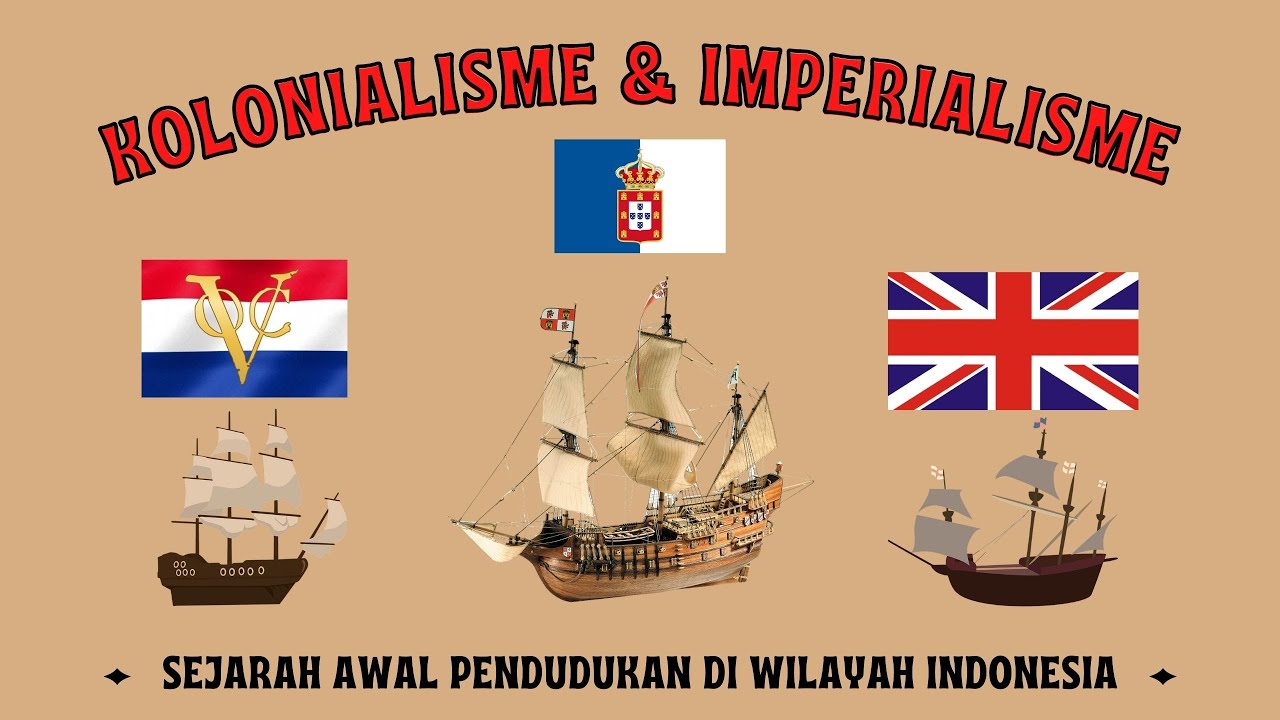Politik Hegemoni bangsa eropa di Indonesia
Summary
TLDRThis video explores the history of European hegemony in Indonesia, focusing on the influence of Portuguese, Spanish, and Dutch colonial powers. The Portuguese first arrived in 1512, establishing trade relations and fortifications, but were expelled by local forces. After disputes with Spain over territorial claims in the Maluku Islands, Portugal's power waned. The Spanish briefly entered the archipelago but eventually withdrew. The Dutch, starting in the late 1500s, monopolized the spice trade, dominating the region after Portuguese withdrawal. The video provides a comprehensive overview of European colonial efforts and rivalries in Indonesia during this period.
Takeaways
- 😀 Hegemony, derived from the Greek word 'hegemonia', means control over certain groups through intellectual and moral leadership.
- 😀 European powers, particularly the Portuguese, first arrived in Indonesia in 1512 under the leadership of Afonso de Albuquerque.
- 😀 In 1511, the Portuguese conquered Malacca before entering Indonesia and establishing a trade agreement with the Sunda Kingdom in 1522.
- 😀 In 1526, the Demak Sultanate took over the Sunda Kingdom, expelling the Portuguese in 1527, led by Fatahillah.
- 😀 After being expelled, the Portuguese refocused on the Maluku Islands and allied with the Sultanate of Ternate to monopolize the spice trade.
- 😀 The Portuguese alliance with the Sultanate of Ternate ended in 1575, when Sultan Babullah expelled them from the region.
- 😀 The Spanish entered Indonesia in 1521 through the Philippines and reached the Maluku Islands, where they allied with the Sultanate of Tidore against the Portuguese.
- 😀 The Treaty of Saragosa in 1529 resolved the conflict between Spain and Portugal over the Maluku Islands, with Spain withdrawing to the Philippines.
- 😀 The Dutch first arrived in Indonesia in 1596, with the expedition led by Cornelis de Houtman, landing in Banten.
- 😀 Following the Dutch success in monopolizing the spice trade, they eventually took control of the Maluku Islands after the Portuguese left the region.
Q & A
What is the meaning of the term 'hegemony' as discussed in the script?
-Hegemony comes from the Greek word 'hegemonia,' meaning ruler or leader. It refers to the control exerted over certain groups through intellectual and moral leadership, and can also be understood as a struggle for political power.
When did the Portuguese first arrive in Indonesia and what was their initial strategy?
-The Portuguese first arrived in Indonesia in 1512 under the leadership of Afonso de Albuquerque, after conquering Malacca in 1511. They signed a trade agreement with the Sunda Kingdom, which allowed them to establish a fort and warehouse in Sunda Kelapa in 1526.
Why did the Portuguese face resistance from the Demak Sultanate in 1527?
-The Demak Sultanate, concerned about Portuguese expansion and influence, conquered the Sunda Kingdom in 1527. This led to the expulsion of the Portuguese from Sunda Kelapa by Fatahillah’s forces.
How did the Portuguese attempt to maintain control over the spice trade in the Maluku Islands?
-The Portuguese collaborated with the Sultanate of Ternate to monopolize the spice trade in the Maluku Islands. However, this alliance ended in 1575 when Sultan Babullah expelled the Portuguese from the region.
What role did the Spanish play in the early European interactions in the Indonesian archipelago?
-The Spanish entered the region in 1521, initially reaching the Maluku Islands via the Philippines. They allied with the Sultanate of Tidore to counter the Portuguese-backed Sultanate of Ternate, but their presence was short-lived after the Treaty of Saragosa in 1529.
What was the significance of the Treaty of Saragosa in 1529?
-The Treaty of Saragosa, signed between Spain and Portugal, resolved their territorial dispute over the Maluku Islands. It resulted in Spain withdrawing from the region, leaving Portugal in control of the spice trade in Maluku.
When did the Dutch first arrive in Indonesia, and what were their initial objectives?
-The Dutch first arrived in Indonesia in 1595 under the leadership of Cornelis de Houtman, landing in Banten. Their primary objective was to establish a monopoly over the spice trade in the region.
What was the outcome of the Portuguese's efforts in the Maluku Islands by the early 1600s?
-By the early 1600s, the Portuguese were expelled from the Maluku Islands, and the Dutch took control of the spice trade in the region, marking the beginning of their dominance in Southeast Asia.
How did the Dutch influence in Indonesia evolve after their arrival in the late 1500s?
-After their arrival in the late 1500s, the Dutch sent multiple expeditions, eventually gaining control of the Maluku Islands and monopolizing the spice trade. They established a dominant colonial presence in Indonesia that lasted for centuries.
What does the history of European hegemony in Indonesia reveal about the geopolitical struggles of the time?
-The history of European hegemony in Indonesia highlights the intense competition among European powers—Portugal, Spain, and the Netherlands—who sought control over the lucrative spice trade. This geopolitical struggle had lasting effects on the region's political and economic landscape.
Outlines

هذا القسم متوفر فقط للمشتركين. يرجى الترقية للوصول إلى هذه الميزة.
قم بالترقية الآنMindmap

هذا القسم متوفر فقط للمشتركين. يرجى الترقية للوصول إلى هذه الميزة.
قم بالترقية الآنKeywords

هذا القسم متوفر فقط للمشتركين. يرجى الترقية للوصول إلى هذه الميزة.
قم بالترقية الآنHighlights

هذا القسم متوفر فقط للمشتركين. يرجى الترقية للوصول إلى هذه الميزة.
قم بالترقية الآنTranscripts

هذا القسم متوفر فقط للمشتركين. يرجى الترقية للوصول إلى هذه الميزة.
قم بالترقية الآنتصفح المزيد من مقاطع الفيديو ذات الصلة

SEJARAH KOLONIALISME & IMPERIALISME DI INDONESIA

RANGKUMAN MATER "KEDATANGAN BANGSA BARAT KE INDONESIA" Kelas 8

SEJARAH KOLONIALISME & IMPERIALISME DI INDONESIA

kolonialisme dan imperialisme bag 1

Kenapa Portugis begitu semangat datang ke Maluku?

Sejarah kedatangan Potugis ke Indonesia Tujuan Hingga Pengaruhnya
5.0 / 5 (0 votes)
